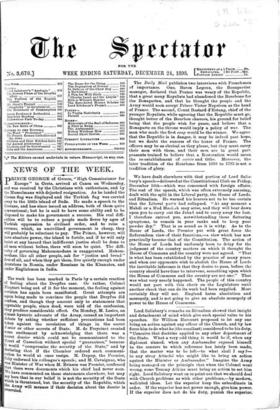The week has been marked in Paris by a certain
reaction of feeling about the Dreyfus case. Or rather, Colonel Piequart being out of it for the moment, the feeling against revision has again been manifested. Great attempts are again being made to convince the people that Dreyfus did confess, and though they amount only to statements that reputable people, since dead, were told of the confession, they produce considerable effect. On Monday, M. Lasies, an almost hysteric advocate of the Army, caused an important debate by asking whether sufficient precautions had been taken against the revelation of things in the secret t issier or other secrets of State. M. de Freycinet created 81ule excitement by acknowledging that there was a secret dossier which could not be communicated to the Court of Caseation without special "guarantees," because 1. would "compromise the security of the State," and by declaring that if the Chamber ordered such communi- cation he would at once resign. M. Dupny, the Premier, fully endorsed his colleague's speech; and M. Cavaignac, who /.a8 Minister of War when M. Brisson was Premier, confessed that there were documents which his chief had never seen. We have commented on these statements elsewhere, but may say here that in our belief it is not the security of the State 7,Mch is threatened, but the security of the Republic, which ule Army will menace if their decision about the dossier is
°Ten'uled.






































